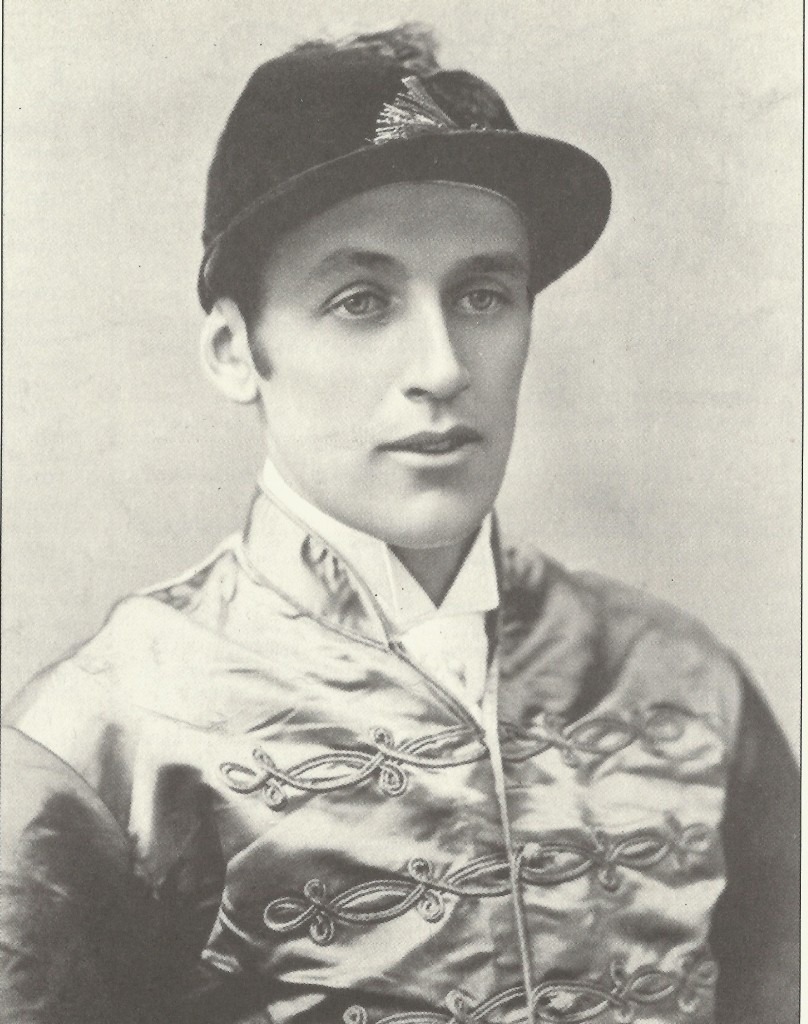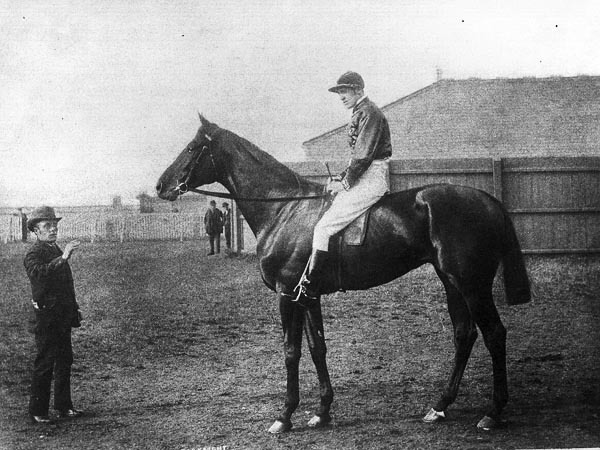
By Abbeigh Harris
Emma Hayward and William Archer welcomed their second son, Fred Archer into the world on the 11th January 1857. Born in Cheltenham, it was not surprising that he grew up to become a jockey; his father, older brother and later, younger brother, were all jockeys. It could be said that horse racing was in his blood from the moment he entered the world.
15 years before Fred was born, his father William won the world’s greatest steeplechase, the Grand National in 1842 on Little Charlie.
When Fred was 2, the family moved to Prestbury, where his father became the landlord of the King’s Arms pub. Fred learnt to ride at a young age and by the time he was 8 years old, young Fred was already riding in pony and donkey races.
The start of something special
Now the home of Sir Mark Prescott, Heath House in Newmarket is where Fred was apprenticed to Matthew Dawson when he was just 10 years old. The Dawsons had no children of their own, so took on Archer as their own when he was bullied by other lads at the stable
At just 12 years of age, he rode in the Newmarket Town plate and a year later in 1870, won his first race under Jockey Club rules at Chesterfield racecourse on Atholl Daisy. Weighing just 4stone 11lb (67 lbs) as a child, Fred ultimately grew to be 5ft 10 and hit 11stone (154 lbs) during the winters.
‘I have a wonderful boy here who will do marvellous things’
1872 saw his first big win, aboard Salvanos in the Cesarewitch; Fred weighed just 5 stone (70 lbs); this was the year his apprenticeship ended. Tom French was the leading stable jockey for Dawson, however he became ill in 1873 which led to Fred receiving more rides and riding 107 winners that year, coming second in the jockey championship to Harry Constable. Heartbreakingly, French died later in the year due to the excessive wasting demands of being a jockey.
1874 was a turning point for Archer, when he achieved his first classic win in the 2,000 Guineas aboard Atlantic; that same year he became retained jockey for Lord Falmouth, whom he would go on to win over half his classics for.
In 1875, he completed the 1,000 Guineas and Oaks double on Spinaway. Two years later aboard Silvio for Lord Falmouth, he won his first Derby and then went on to win the St Leger.
One of Archers favourite horses, Wheel Of Fortune, won the 1,000 Guineas and Oaks in 1879 and went on to win the Yorkshire Oaks. She was going to go for the UK Triple Crown but unfortunately the horse broke down going for her second race at York just two days later.
Unhealthy lifestyle
Even now, jockeys have to waste to reach the correct weight in a race. At 5ft 10, Fred’s weight started to become a problem, he already had to diet a lot more than his fellow jockeys to maintain his racing weight of 8st 10lbs (122 lbs). This was ultimately the start of a tragic downward spiral.
His low weight was aided by Turkish baths and shockingly, Fred tended not to eat solids and used alkaline medicines to purge, made up by a doctor in Newmarket.
A poor walker and unable to run, he was unable to lose weight through exercise, which exacerbated his unhealthy habits to lose weight. When he ate, his diet consisted of: half an orange, a sardine, a nip of champagne or castor oil, a biscuit and a small champagne at lunchtime.
Success and heartbreak
Archer came from behind on Bend Or to beat Robert the Devil in the 1880 Derby by a head, mading the gutsy move to go along the rails to grasp success. Dutch Oven won the St Leger in the same year and there was much controversy that Fred had pulled the horse in the Yorkshire Stakes to get better odds for this race, however this was said to be unfounded.
Marrying into the family that welcomed him with open arms, Archer married his trainer’s niece, Rose ‘Nellie’ Dawson in January 1883 in Newmarket. A brilliant firework display lit up the night sky on their wedding day with the words ‘May they be happy’; a statement that would soon go on to prove false.
In January of 1884, Fred and Rose’s son, William, died at birth. He was named after Fred’s brother who tragically died in a hurdle race at Cheltenham.
Getting pregnant again in November 1884, Rose gave birth to a daughter called Nellie; Fred found out by a telegram message after riding Thebais to victory in the Liverpool Cup. Thought to be the result of post-natal eclampsia, Nellie started convulsing and passed away after the birth of their daughter.
The Tin Man triumphs
He was nicknamed the The Tin Man due to his love of money.
Fred made lots of shrewd investments with most of his money but had also squandered around £250,000 by the time of his death. It is said he asked bystanders for coins to put in his breeches to increase his riding weight when he was short of money for the race, but never returned the money.
Falmouth Lodge and Stables, now known as Pegasus Stables was built by Archer in 1882.
1885, the year after his wife’s death was ironically Archers most successful year in the saddle; he went on to win the 2,000 Guineas on Paradox, the Oaks on Lonely, the Derby and the St Leger on Melton, followed by the Grand Prix de Paris on Paradox. In his final season, he won the Derby and St Leger on the superstar Ormonde.

He Finished the year on 246 winners, this record remained unbroken until Gordon Richards in 1933! Over his short career, Archer won five Derbys, had 21 classic wins and overall won 2748 races in 8084 races.
He was Champion Jockey between 1874 and 1886, an incredible feat considering his young age.
Untimely death
In October of 1886, Archer needed to lose 6lbs over 2 days in for what would turn out to be his first and only ride over in Ireland, on Cambusmore for Lord Londonderry in the Lieutenants Plate at The Curragh, a race he won with great ease.
After this success and returning home, he wasted down to 8st 7lb for the Cambridgeshire, he went 3 days without food. He fell ill and had to return home, where he had a very high fever.
On the 8th November 1886 he was at his home, Falmouth House, in Newmarket under medical supervision. His sister visited him at about 2:25 and he asked her to send the nurse out of the room, which turned out to be a fatal mistake; whilst she was looking out the window, he jumped out of bed and asked her “Are they coming?”. With a gun in his hand, he put it in his mouth and fired the revolver. The bullet passed out through his neck, and he tragically died bleeding in his sister’s arms.
An inquest into his death was held, where it was stated “The deceased committed suicide whilst in a state on unsound mind”. Archer was just 29 years of age. His death was attributed to the death of his wife two years earlier, wasting, and possibly due to the fact he had £30,000 of debt.
He had previously spoken to his friend about his late wife saying “She was taken away from me at the very moment that my happiness did really seem to me to be so great and complete as to leave nothing else in this world I could really wish for”.
A fortune of £66,662 was left for his daughter Nellie, which would be around 7 million pounds in today’s money.
You can see some of his personal affects in the National Horse Racing museum in Newmarket, which includes the gun he shot himself with! He was buried in Newmarket Cemetery and his burial plot can be found to the right of the chapel.
It is said that his ghost rides a light grey horse over Newmarket Heath.

